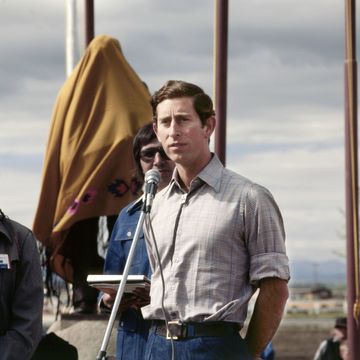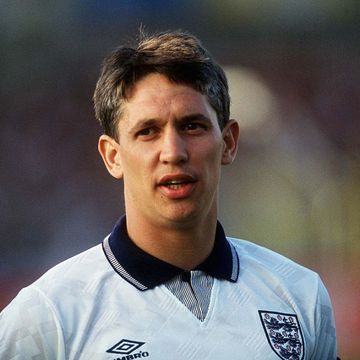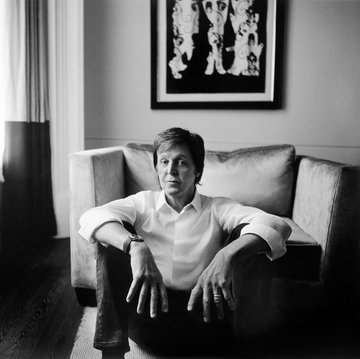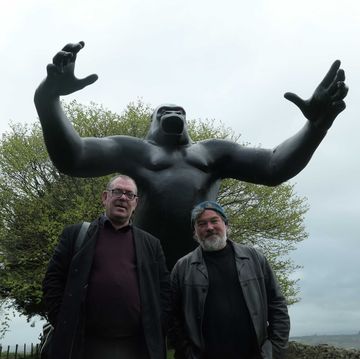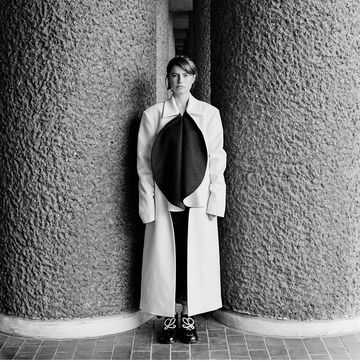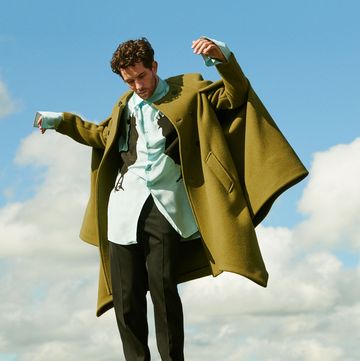If you were to ask me what is the single most extraordinary scene in any film I've watched in the last few years, I well might pause and brood about all those great movies by the masters of world cinema, all those films I have savoured in darkened rooms all over London's West End. Paul Thomas Anderson's Inherent Vice; Andrey Zvyagintsev's Leviathan; Kathryn Bigelow's The Hurt Locker; Roy Andersson's A Pigeon Sat on a Branch Reflecting on Existence; Martin Scorsese's The Wolf of Wall Street. All are brilliant films. But what is the scene that I find myself thinking about and mentally humming along to? What is the scene that I will, in an idle moment — when I am supposed to be working — call up on YouTube and watch on my laptop again and again while munching Doritos.
Easy. It's the now legendary Quicksilver in the Pentagon scene from X-Men Days of Future Past, directed by Bryan Singer. Any Marvel fan, any superhero fan will know exactly what I'm talking about. But any cinephile should know as well, anyone who cares about the art and craft of film-making, anyone who can thrill to the strange, unquantifiable, uncategorisable flashes of genius that can crackle across the screen.
Quicksilver (played by young American actor Evan Peters) is a mutant in the X-Men, a band of controversial and ambiguous superheroes, variously admired and feared for powers which set them apart from normal humanity. Quicksilver, who has the ability to move at great speeds — and to very briefly recap — has turned up at the Pentagon with Professor Xavier (played by James McAvoy) and also Wolverine (played by Hugh Jackman). The three are on a mission to rescue another of the X-Men from jail, the one who has gone over to the dark side — Magneto (Michael Fassbender) held in prison for his attempt on the life of President John F Kennedy. Quicksilver, Magneto and the others are cornered in a kitchen; guards open fire on them — and Quicksilver springs into action.
We watch time slow waaaay down, while impish, puckish Quicksilver dashes naughtily about the room, plucking the bullets out of the air as they drift towards him and his friends; casually, he musses the hair of security guards and cheekily tastes their coffee as it spills in slo-mo out of a cup. He repositions their fists against their faces and their guns up in the air so that there will be bizarre mayhem when their normal time recommences. All the time, Xavier's face is caught and frozen in a furious yell. But the stroke of pure genius is that this breathtakingly exciting action sequence is accompanied by Jim Croce's yearning and sad 1973 guitar ballad "Time in a Bottle", a song about the fact that life goes by so fast and there's nothing you can do about it.
There is something absolutely compelling about the juxtaposition of that poignant song and the thrilling scene that's happening over it. Fight scenes in films are often praised for being "balletic" — mostly by critics who've never seen a ballet or, indeed, a fight in their lives — but this is beyond balletic. It is operatic, dynamic, melancholic and, of course, cinematic. Its emotional and dramatic effects don't really make sense, but they are superb.
It could only happen in a superhero film. Only the superhero genre, with its licensed suspension of the accepted conventions of plausibility and, indeed, the rules of gravity, could get away with it. It's part of the reason why I have come to love superhero films.
Superhero movies are the new superpower in world cinema. They are the new tentpole. They sell tickets and DVDs and downloads and they are a licence to print money. Superhero films rule the world. And actors and actresses know that to make it really big, you've got to be prepared to pull on the lycra and the cape — or else star in a huge YA franchise. Jennifer Lawrence did both: she was in The Hunger Games as Katniss and also in X-Men as Raven/Mystique.
Since Christopher Reeve first played Superman in 1978, with the poster tagline "You'll believe a man can fly", the idea of the film-superhero has been commonplace, but it has only been relatively recently that film-superhero production has been industrialised in the way we now understand it, really with the first X-Men film at the start of the last decade. Now Marvel Studios, a creation of the original Marvel comic books, is a production powerhouse, with dozens of films with dozens of heroes. Spider-Man, the X-Men, Hulk, Thor, Iron Man, The Fantastic Four, Guardians of the Galaxy, Deadpool and so on. Marvel's rival DC Comics, of course, has its own stable, with Batman and Superman, two legendary figures who have themselves faced off in a recent film.
It's an unusual week in the film business when there isn't a superhero film which has been extensively trailed with an excitable social media campaign. This often includes a special appearance by its director and stars at the fan convention Comic-Con, in an attempt to get the fans on board — the all-important guardians of the flame, whose disapproval can turn the web and connoisseur opinion against the film in question.
But the critical fraternity is scratchy about superheroes. We moan. We grump. We whinge. We declare ourselves to be sick of the sight of them, and denounce them as childish and dumbed down. We look at the list of superhero films slated for the coming year and wonder if there isn't some way we can take the rest of our working lives off.
I say "we" but I mean "they", because I don't worry about superhero films. I positively look forward to them. They are surreal and extravagant gestures of colour in a dull world; they are detonations of pop-art fun; an almost abstract distillation of adventure, of the need for action and confrontation. They are about the need to escape our ordinary, mundane lives.
Superhero films are the new Westerns. Cowboy films were once produced en masse by Hollywood — and it was part of its genius to persuade the world to accept, as a kind of universal reality, something which was certainly an important but minority experience: the pioneers, the homesteaders and ranchers of the old west. Audiences understood, or thought they understood what a cowboy was, and didn't trouble with the problem of what this cowboy could be doing when there seemed to be no actual cows for him to busy himself with from the beginning to the closing credits. From the end of World War II until the Seventies, Westerns were a lingua franca in cinemas and especially on television — it was quite normal when people in a TV drama had to be shown watching television for us to hear gunfire and whooping of "red Indians" echoing from their TV set.
But the Sixties space race put an end to that. Science fiction was the new pop genre and astronauts became the new cowboys, and aliens the new Apaches. The wide open spaces of the old west became the vast cold reaches of space and the Western collapsed, in very short order. It still exists of course, though not on the same level as before. But science fiction in those days had a thrilling factual dimension. When Kubrick's 2001 came out in 1968, the moon was on the verge of being conquered; people assumed that space exploration would continue at the same rate. The passing of the baton from the Western to science-fiction was tellingly symbolised in Pixar's Toy Story (1995), by the anguish of Woody in becoming obsolete compared to the all-conquering and all-selling Buzz Lightyear.
Toy Story was prophetic, because Buzz Lightyear wasn't simply a sci-fi figure. He was a superhero — he could fly. The genius of Toy Story was to have shown in embryo the essential passing of the genres: Westerns, sci-fi — and now superheroes.
And what's wrong with that? People complain that they are all the same. I counter by saying that they have recognisable constituent elements: aren't there unifying elements in romcoms? In thrillers? In weepies? In noirs? What's the problem with superhero films? They are no more infantile than all the horror films that come out of the chute every week and which are treated with saucer-eyed reverence by critics. And actually much less juvenile.
Another word should be said about Pixar, and in particular its brilliant and groundbreaking 2004 superhero film The Incredibles, which paid affectionate tribute to the genre, and what might happen to superheroes if their super-ness was somehow amputated by an uncaring and mediocre society. Anyone who has seen that film knows that the moment at which Elastigirl and her children, Violet and Dash, are shot down in their plane is one of the most exciting action sequences of recent times.
The superhero genre has given us one of the greatest, in fact the greatest bad guy of modern times: The Joker, as played by Heath Ledger, in Christopher Nolan's The Dark Knight (2008) — a villain who isn't played by a British thesp with a tongue-in-cheek top note of camp, but a villain who really does seem to be a genuine force of evil. Ledger is still the best supervillain I have come across on screen.
Superhero films are also funny. In fact, outside of that much critically snobbed-at and patronised genre, comedy, there is hardly any other type of film with a genuine interest in humour. I loved Robert Downey Jr's sustained and bravura performance as Iron Man: the neurotic, needy, wisecracking man in the iron suit which is virtually a metaphor for his carapace of defensive wit. Guardians of the Galaxy (2014) is a hilarious Star Wars-type adventure; Ryan Reynolds' Deadpool is an amusingly alienated, fast-talking hero and Paul Rudd's Ant-Man in this year's Captain America: Civil War is an uproariously weird super-underdog, the human who gains advantage by becoming tiny and occasionally gigantically large. There is pure absurdism in superhero films — and pure surrealism.
Something else has happened to me to make me love superhero films. I became a dad to a son. The effect wasn't instantaneous. Dominic had to grow up, and at the age of 11 he became a fanatical superhero fan — one who is hugely overexcited at the thought of the new Avengers film, the new X-Men film, and — pathetic though this is to admit — pretty impressed with me for having seen these films earlier than everyone else. He will quiz me with ferocious attention to detail about what happens in them, and when we go and see them together, initiate long and complex discussions about who would beat who in a fight. It reminds me of someone I know. Oh yes. Me!
I was 11 years old when I first discovered Spider-Man. It was down at our little Hertfordshire village corner shop (the village was Letchmore Heath, incidentally, where the 1960 British sci-fi horror classic The Village of the Damned was filmed). Along with Whizzer and Chips and Valiant (and also Penthouse, which exerted its own fascination) the shop was stocking the first edition of the new UK Spider-Man Comics Weekly. I bought it and took it home and turned its pages as reverently as a first edition Gutenberg Bible. If I had it now, I could sell it on eBay and secure my pension arrangements, but when I left home, my mum threw it out, — along with issues 2–20.
Anyway. Spider-Man was fighting an appalling villain called Electro, and Thor had a kind of second-billing to Spider-Man. I was instantly hooked: not because of the escapism but because of the brutal social realism. Spider-Man is still the only superhero I have ever come across who came close to showing you what this vocation would actually mean in real life — it would mean letting down and upsetting your friends and family all the time, without ever being able to explain why.
Instantly, as I lolled listlessly in my bedroom, with Snoopy posters on the wall, I grasped his essential dilemma and how it played on my own normality, banality and endless self-reproach. Spider-Man was admired, while weedy, pathetic Peter Parker was not. And, in fact, Spider-Man was loved by the very people who despised Parker: the pretty girls, the big men on campus. Spider-Man was younger than other superheroes, a high-school pupil, and so the idea of swinging daringly through the big city was even more audacious — although then as now I wondered how he could swing like this without anything positioned directly overhead for his webbing to attach to. (Much later, I would read the superb analysis of Spider-Man by the critic Sukhdev Sandhu — who said that shooting webbing out of your wrists was a wish-fulfilment transformation of wanking.)
Spider-Man was the superhero as victim, the superhero who suffered from depression and didn't scruple to transmit his depression to the reader. Sometimes the stories, as they ended in the UK Spider-Man Comics Weekly, would finish so grimly that the film versions should really be directed by Ken Loach. Not all the time, I hasten to add, but he underlined the essential seriousness of the whole superhero enterprise: teenagers of a slightly later vintage had Morrissey. I had Spider-Man.
And one of the great restorative and redemptive things about the Spider-Man movies for me is the way they absorbed some of this darkness, but repositioned him in the superhero marketplace as a (young) man of action. The movies exorcised some of the unwholesome melancholy of my young Spider-Man fanhood while speaking to its essentially contemplative nature. The three actors who have played Spider-Man so far — Tobey Maguire, Andrew Garfield and Tom Holland — have all been good in their way, although it is perhaps strange, sleepy-eyed Maguire who came closest to how I saw the part, and the role seems to have ended his career. At 41, he doesn't seem to have found anything since to rival the great super-arachnid.
Well, my son and I were never real collectors of the comics, so maybe neither of us can be considered real fans — and I actually have respect for the fans. Like horror fans, superhero fans can be dedicated, focused, passionate and articulate. They are bracingly intolerant of factual inaccuracy. The new digital age of journalism and criticism has put me in touch with fans and reintroduced me to the fact that cinema is not only a mass medium, but a democratic medium. It is shaped by its consumers. Critics who simply look down their noses at superhero films are cutting themselves off from a great driving force. Superheroes are the Olympics, the Wagner, the circus, the action painting and Premier League of the cinema. We can't do without them.



